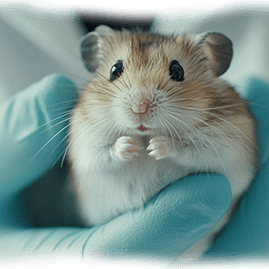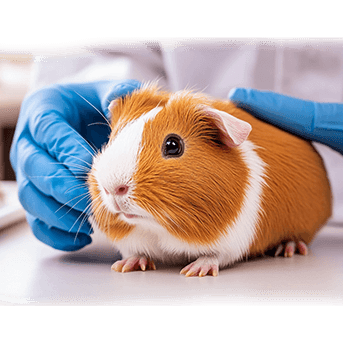Mouse and Rat Health: Essential Tips for Keeping Your Small Pets Healthy
Mice and rats make excellent small pets due to their intelligence, cleanliness, and sociable nature. However, just like any pet, they require proper care to stay healthy. Understanding the common health issues and how to prevent them is key to ensuring your pet mouse or rat lives a long and happy life.
Here, we’ll cover the basics of mouse and rat health, common health problems, preventive measures, and helpful care tips to keep your small pets in the best condition.
Common Health Problems in Mice and Rats
Both mice and rats are generally hardy pets, but they are still susceptible to certain health issues. Early detection of symptoms and proper care can prevent many of these conditions from becoming serious.
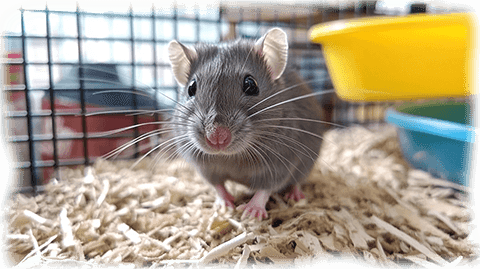
Respiratory Infections
Respiratory infections are one of the most common health problems in both mice and rats. These pets are prone to lung and airway issues, often caused by poor cage hygiene, dusty bedding, or environmental stress.
Symptoms of Respiratory Infections
- Difficulty breathing or wheezing
- Sneezing or nasal discharge
- Lethargy or loss of appetite
- Clicking sounds when breathing (especially in rats)
Prevention Tips
- Use low-dust, non-toxic bedding such as paper or aspen bedding. (Amazon affiliate link)
- Ensure the cage is cleaned regularly to prevent ammonia buildup from urine.
- Keep your pet’s living area well-ventilated and away from drafts or direct sunlight.
Tumors (More Common in Rats)
Tumors are a common issue in pet rats, particularly in females. While some tumors are benign, others can be malignant and may require surgical removal.
Symptoms of Tumors
- Lumps or masses under the skin, often around the chest or abdomen
- Changes in appetite or activity level
- Visible discomfort or difficulty moving
Prevention and Management
- Spaying female rats can help reduce the risk of mammary tumors.
- Regularly check your rat for lumps and consult a veterinarian if you detect any abnormalities.
- If a tumor is detected early, surgery may be an option, so it’s important to monitor your rat’s health closely.
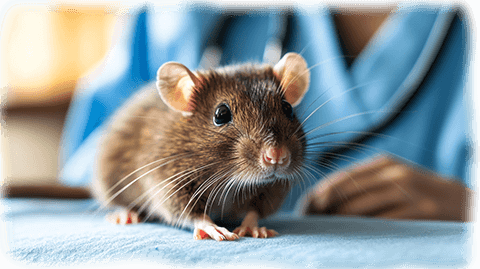
Dental Problems
Both mice and rats have teeth that continuously grow throughout their lives. Overgrown teeth can lead to difficulties eating, infections, or pain.
Symptoms of Dental Issues
- Drooling or wetness around the mouth
- Difficulty eating or loss of interest in food
- Weight loss
- Overgrown or misaligned teeth
Prevention Tips
- Provide chew toys or safe wood blocks to help your mouse or rat naturally wear down their teeth. (Amazon affiliate link)
- Regularly check their teeth for overgrowth and consult a vet if trimming is required.

Parasites
Mice and rats can suffer from various parasites, including mites, lice, and fleas. Infestations can cause skin irritation, hair loss, and discomfort.
Symptoms of Parasites
- Excessive scratching or biting at the skin
- Hair loss or bald patches
- Scabs or irritated skin
Prevention and Treatment
- Keep the cage clean and regularly change bedding to prevent infestations.
- If parasites are detected, seek veterinary advice for appropriate treatments such as anti-parasitic medication.
- Quarantine any new pets before introducing them to prevent the spread of parasites.
Obesity
Rats, in particular, are prone to obesity due to their love for food. Mice can also gain excessive weight if not given a proper diet and exercise.
Symptoms of Obesity
- Difficulty moving or lethargy
- Excessive body fat
- Struggling to groom properly
Prevention Tips
- Feed your mice and rats a balanced diet that includes high-quality commercial pellets and fresh fruits and vegetables.
- Avoid giving them high-fat or sugary treats, which can contribute to weight gain.
- Provide opportunities for exercise with wheels, climbing structures, and playtime outside the cage. (Amazon affiliate link)
Preventive Health Care for Mice and Rats
To keep your mice and rats healthy, it’s important to focus on preventive care. Here are a few helpful tips for maintaining their overall well-being:
Clean Living Environment
- A clean cage is vital to preventing infections and respiratory problems. Clean the cage at least once a week and spot-clean any soiled areas daily.
- Use non-toxic, low-dust bedding, and ensure the cage is well-ventilated.
Balanced Diet
- Feed a diet rich in fiber, including high-quality rodent pellets and small portions of fresh vegetables and fruits. (Amazon affiliate link)
- Avoid giving processed human food, which can cause digestive issues or weight gain.
Exercise and Enrichment
- Mice and rats need mental stimulation and physical exercise to stay healthy. Include tunnels, chew toys, climbing structures, and exercise wheels in their cages. (Amazon affiliate link)
- Allow supervised playtime outside the cage in a safe, enclosed area.
Regular Health Checks
- Perform regular health checks to look for signs of illness or injury. Examine their skin, fur, eyes, teeth, and nails.
- Weigh your pets regularly to monitor for any significant weight changes.
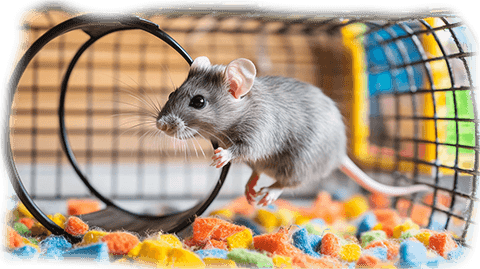
When to See a Veterinarian
It’s crucial to take your mouse or rat to the vet if you notice any concerning symptoms. Regular vet check-ups can help prevent minor health issues from turning into serious problems. Consult your vet if you observe:
- Persistent sneezing or breathing difficulties
- Lumps or tumors
- Changes in appetite or weight
- Excessive scratching or skin irritation
- Lethargy or unusual behavior
A vet experienced with small pets will be able to recommend appropriate treatments, dietary adjustments, and preventive measures to keep your pet healthy.
Conclusion
By providing proper care, a balanced diet, and regular health checks, you can ensure your mice and rats live happy, healthy lives. Be mindful of common health problems, and act quickly if you notice any signs of illness. Prevention is key, so maintaining a clean environment and offering plenty of exercise and enrichment will help your pets thrive.
Reading materials: “Rats, Mice, and Dormice as Pets. Care, Health, Keeping, Raising, Training, Food, Costs, Where to Buy, Breeding, and Much More All Included! the Comple” (Amazon affiliate link) by Lolly Brown.
Affiliate Disclosure
This post may contain affiliate links, which means I earn from purchases made through links. Please see the privacy policy page for more details.


